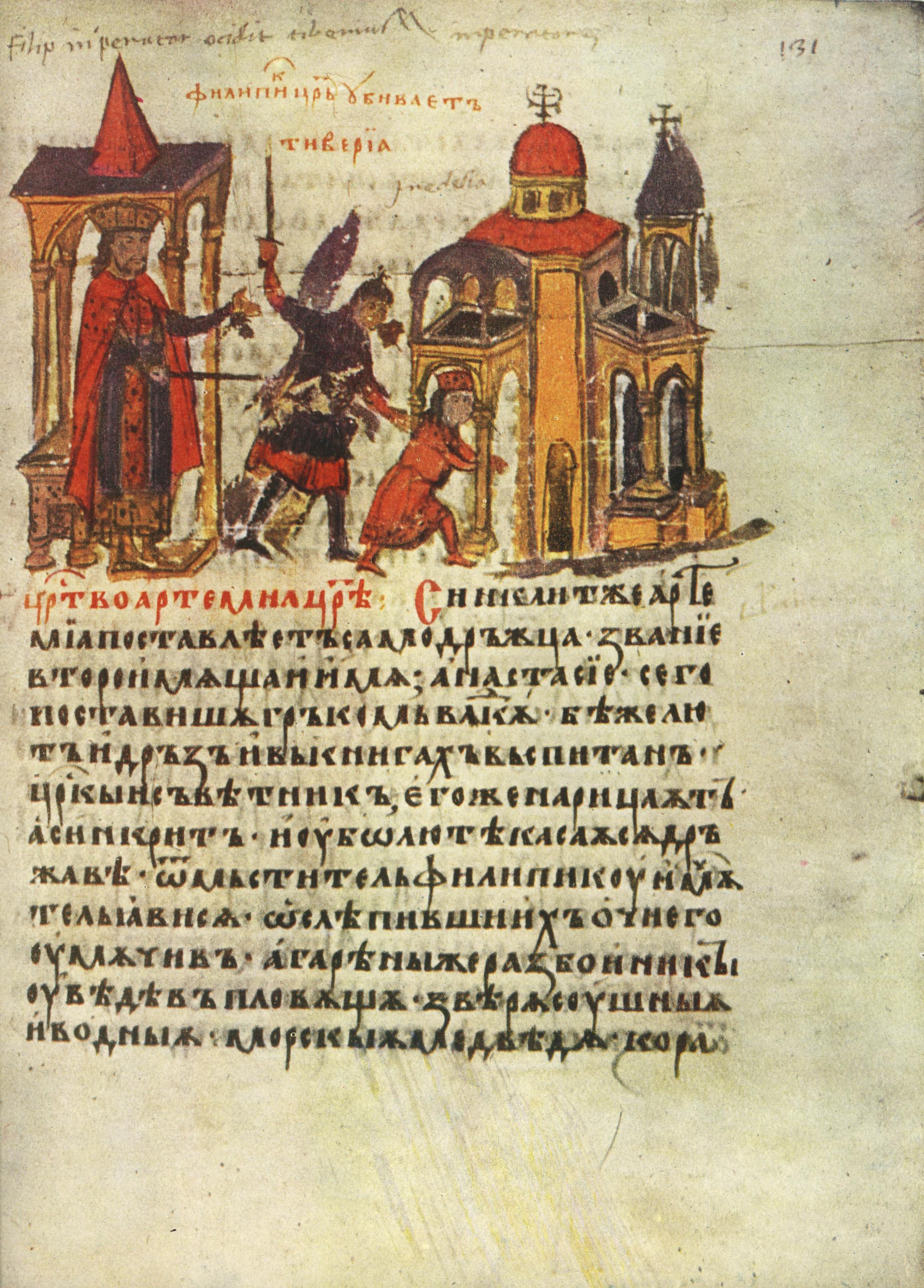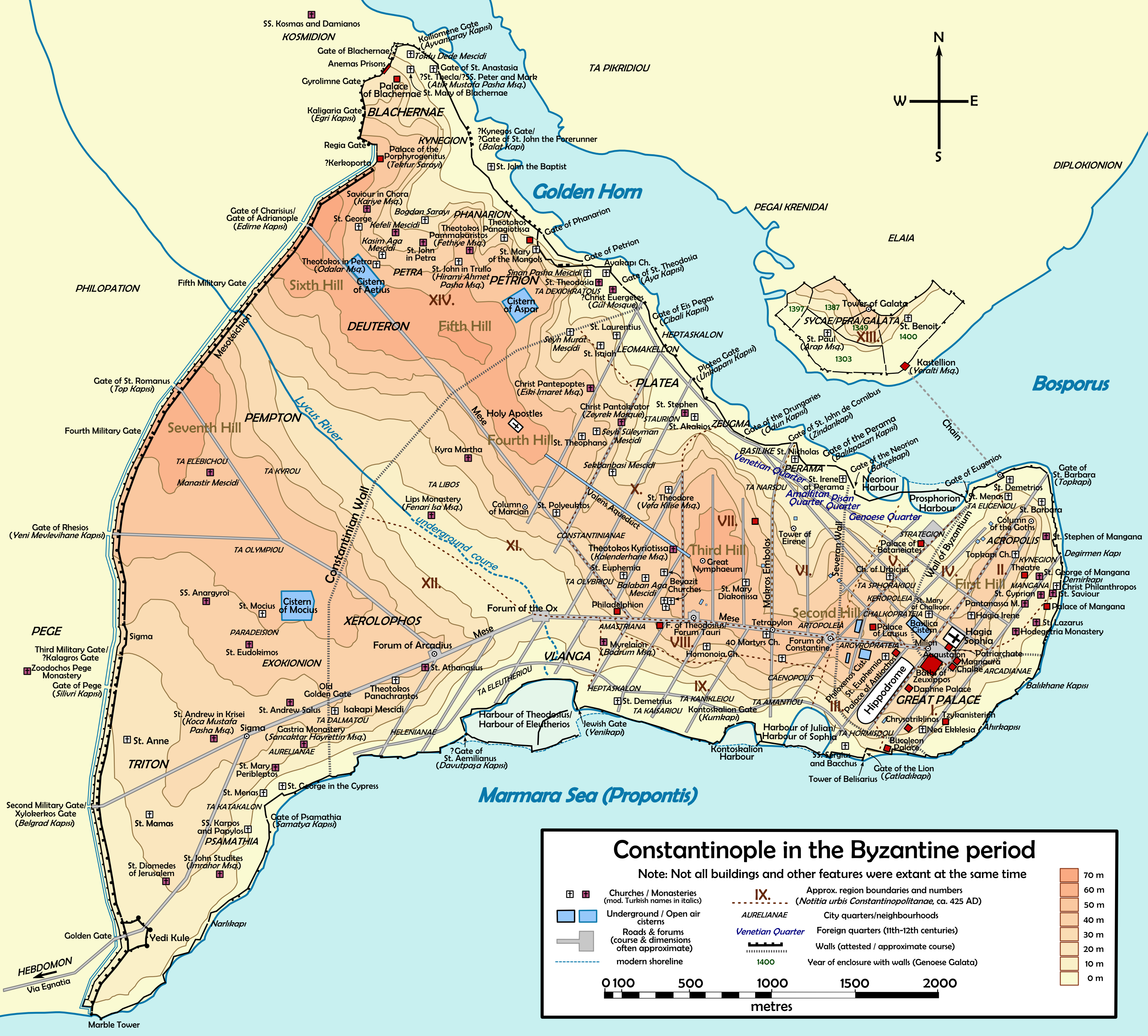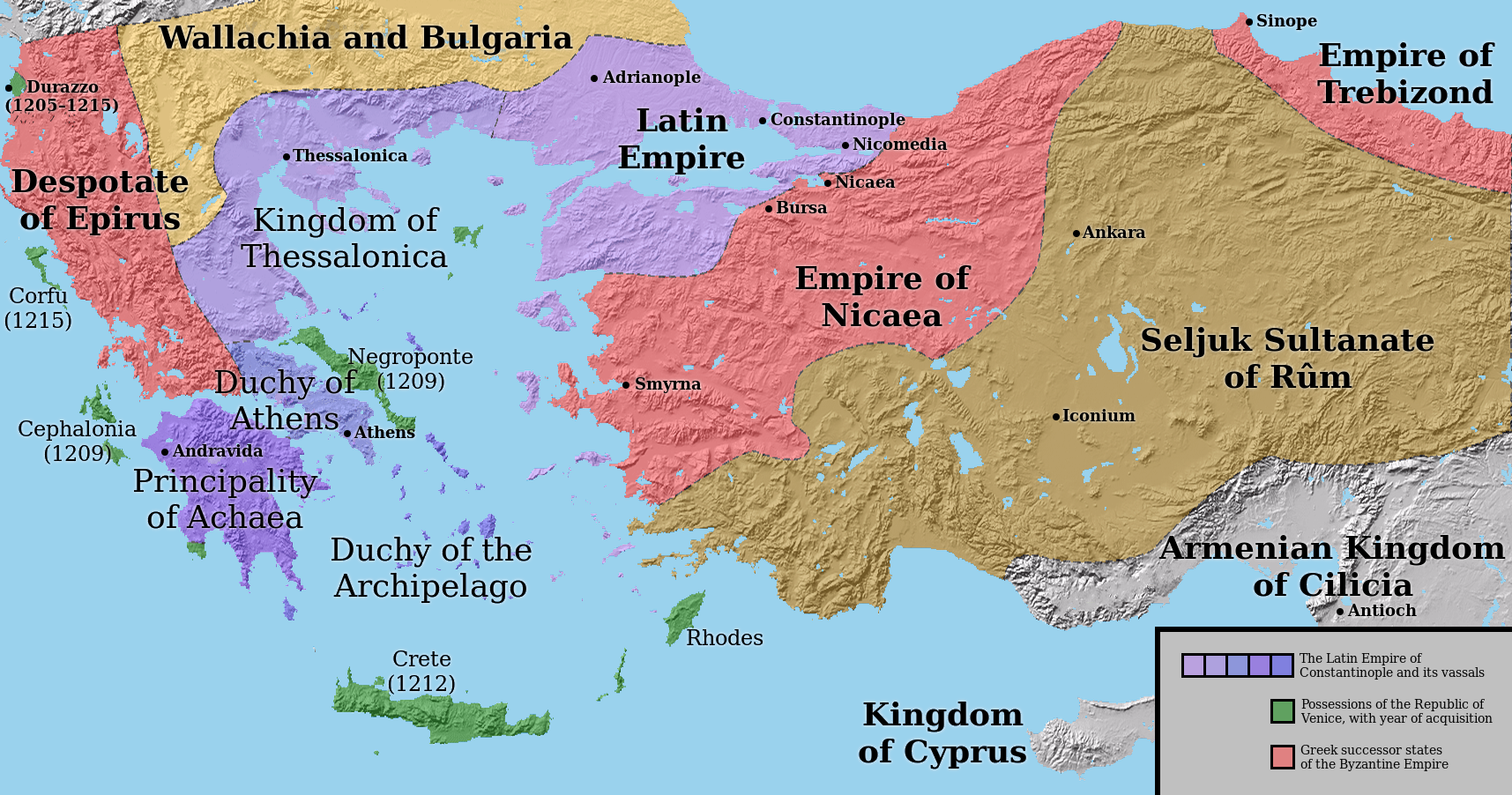|
Parastaseis Syntomoi Chronikai
''Parastaseis syntomoi chronikai'' (, "brief historical notes") is an eighth- to ninth-century Byzantine text that concentrates on brief commentary connected to the topography of Constantinople and its monuments, notably its Classical Greek sculpture, for which it has been mined by art historians. Content The ''Parastaseis'', dedicated to a doubtless imaginary "''Philokalos''", the generic "lover of beauty", are generally interpreted on the simplest level as a kind of tourist's guide to the curiosities of Constantinople, in the manner of the later guides to Rome, '' Mirabilia Urbis Romae'' and '' De Mirabilibus Urbis Romae''. In Classical Greek, a description of a work of art is an '' ekphrasis'', and when considered under this rubric, or compared with the later compilation of notes on Constantinople called the ''Patria'' of Constantinople, the ''Parastaseis'' fail to give an objective description. Instead, the reader is offered anecdotal narratives about the statues, which had ... [...More Info...] [...Related Items...] OR: [Wikipedia] [Google] [Baidu] |
Averil Cameron
Dame Averil Millicent Cameron ( Sutton; born 8 February 1940), often cited as A. M. Cameron, is a British historian. She writes on Late Antiquity, Classics, and Byzantine Studies. She was Professor of Late Antiquity, Late Antique and Byzantine History at the University of Oxford, and the Warden of Keble College, Oxford, between 1994 and 2010. Early life Cameron was born on 8 February 1940 in Leek, Staffordshire. She was the only child of working-class parents, Tom Roy Sutton and Millicent ( Drew) Sutton.The International Who's Who of Women 2002, third edition, ed. Elizabeth Sleeman, Europa Publications, pg. 88 She read ''literae humaniores'' at Somerville College, Oxford, where she was awarded the Edwards Scholarship in 1960 and the Rosa Hovey Scholarship in 1962. From 1962 to 1980, she was married to Alan Cameron (classical scholar), Alan Cameron (1938–2017), a classical scholar. Together they had a son and a daughter. Career From 1965 to 1994, Cameron taught at King's Col ... [...More Info...] [...Related Items...] OR: [Wikipedia] [Google] [Baidu] |
Philippicus
Philippicus (; ), born Bardanes (; ) was Byzantine emperor from 711 to 713. He took power in a coup against the unpopular emperor Justinian II, and was deposed in a similarly violent manner nineteen months later. During his brief reign, Philippicus supported monothelitism in Byzantine theological disputes, and saw conflict with the First Bulgarian Empire and the Umayyad Caliphate. Biography Philippicus was originally named Bardanes (; ); he was the son of the patrician Nicephorus, who was of Armenian extraction from an Armenian colony in Pergamum. The Armenian background of Philippicus has been supported by Byzantinist historians Peter Charanis and Nicholas Adontz, and disputed by Anthony Kaldellis. Kaldellis adds that Bardanes was probably born and raised in the Byzantine realm, as his father Nicephorus possibly was. Contemporaneous sources attest to Bardanes' tutoring, scholarly interests, learning and eloquence, all of which were in Greek. Byzantine historians Leslie Brubaker ... [...More Info...] [...Related Items...] OR: [Wikipedia] [Google] [Baidu] |
Siege Of Constantinople (1204)
The sack of Constantinople occurred in April 1204 and marked the culmination of the Fourth Crusade. Crusaders sacked and destroyed most of Constantinople, the capital of the Byzantine Empire. After the capture of the city, the Latin Empire (known to the Byzantines as the ''Frankokratia'', or the Latin occupation) was established and Baldwin of Flanders crowned as Emperor Baldwin I of Constantinople in Hagia Sophia. After the city's sacking, most of the Byzantine Empire's territories were divided up among the Crusaders. Byzantine aristocrats also established a number of small independent splinter states—one of them being the Empire of Nicaea, which would eventually recapture Constantinople in 1261 and proclaim the reinstatement of the Empire. However, the restored Empire never managed to reclaim all its former territory or attain its earlier economic strength, and it gradually succumbed to the rising Ottoman Empire over the following two centuries. The Byzantine Empire ... [...More Info...] [...Related Items...] OR: [Wikipedia] [Google] [Baidu] |
Fourth Crusade
The Fourth Crusade (1202–1204) was a Latin Christian armed expedition called by Pope Innocent III. The stated intent of the expedition was to recapture the Muslim-controlled city of Jerusalem, by first defeating the powerful Egyptian Ayyubid Sultanate. However, a sequence of economic and political events culminated in the Crusader army's 1202 siege of Zara and the 1204 sack of Constantinople, rather than the conquest of Egypt as originally planned. This led to the Partitio terrarum imperii Romaniae or the partition of the Byzantine Empire by the Crusaders and their Venetian allies leading to a period known as Frankokratia, or "Rule of the Franks" in Greek. In 1201, the Republic of Venice contracted with the Crusader leaders to build a dedicated fleet to transport their invasion force. However, the leaders greatly overestimated the number of soldiers who would embark from Venice, since many sailed from other ports, and the army that appeared could not pay the contracted price. I ... [...More Info...] [...Related Items...] OR: [Wikipedia] [Google] [Baidu] |
Frankokratia
The Frankish Occupation (; anglicized as ), also known as the Latin Occupation () and, for the Venetian domains, Venetian Occupation (), was the period in Greek history after the Fourth Crusade (1204), when a number of primarily French and Italian states were established by the on the territory of the partitioned Byzantine Empire. The terms and derive from the name given by the Orthodox Greeks to the Western French and Italians who originated from territories that once belonged to the Frankish Empire, as this was the political entity that ruled much of the former Western Roman Empire after the collapse of Roman authority and power. The span of the period differs by region: the political situation proved highly volatile, as the Frankish states fragmented and changed hands, and the Greek successor states re-conquered many areas. With the exception of the Ionian Islands and some islands or forts which remained in Venetian hands until the turn of the 19th century, the ... [...More Info...] [...Related Items...] OR: [Wikipedia] [Google] [Baidu] |
Nicetas Choniates
Niketas or Nicetas Choniates (; – 1217), whose actual surname was Akominatos (), was a Byzantine Greek historian and politician. He accompanied his brother Michael Akominatos to Constantinople from their birthplace Chonae (from which came his nickname, "Choniates" meaning "person from Chonae"). Nicetas wrote a history of the Eastern Roman Empire from 1118 to 1207. Life Nicetas Akominatos was born to wealthy parents around 1150 in Phrygia in the city of Chonae (near the modern Honaz in Turkey). Bishop Nicetas of Chonae baptized and named the infant; later he was called "Choniates" after his birthplace. When he was nine, his father dispatched him with his brother Michael to Constantinople to receive an education. Niketas' older brother greatly influenced him during the early stages of his life. He initially secured a post in the civil service, and held important appointments under the Angelos emperors (among them that of Grand Logothete or Chancellor) and was governor of ... [...More Info...] [...Related Items...] OR: [Wikipedia] [Google] [Baidu] |
Constantine The Great
Constantine I (27 February 27222 May 337), also known as Constantine the Great, was a Roman emperor from AD 306 to 337 and the first Roman emperor to convert to Christianity. He played a Constantine the Great and Christianity, pivotal role in elevating the status of Christianity in Rome, Edict of Milan, decriminalising Christian practice and ceasing Persecution of Christians in the Roman Empire, Christian persecution. This was a turning point in the Historiography of the Christianization of the Roman Empire, Christianisation of the Roman Empire. He founded the city of Constantinople (modern-day Istanbul) and made it the capital of the Empire, which it remained for over a millennium. Born in Naissus, a city located in the Roman province, province of Moesia Superior (now Niš, Serbia), Constantine was the son of Flavius Constantius, a Roman army officer from Moesia Superior, who would become one of the four emperors of the Tetrarchy. His mother, Helena, mother of Constantin ... [...More Info...] [...Related Items...] OR: [Wikipedia] [Google] [Baidu] |
Historia Augusta
The ''Historia Augusta'' (English: ''Augustan History'') is a late Roman collection of biographies, written in Latin, of the Roman emperors, their junior colleagues, Caesar (title), designated heirs and Roman usurper, usurpers from 117 to 284. Supposedly modeled on the similar work of Suetonius, ''The Twelve Caesars'', it presents itself as a compilation of works by six different authors, collectively known as the ''Scriptores Historiae Augustae'', written during the reigns of Diocletian and Constantine I and addressed to those emperors or other important personages in Ancient Rome. The collection, as extant, comprises thirty biographies, most of which contain the life of a single emperor, but some include a group of two or more, grouped together merely because these emperors were either similar or contemporaneous. The true authorship of the work, its actual date, its reliability and its purpose have long been matters for controversy by historians and scholars ever since Hermann ... [...More Info...] [...Related Items...] OR: [Wikipedia] [Google] [Baidu] |
Macedonian Renaissance
Macedonian Renaissance () is a historiographical term used for the blossoming of Byzantine culture in the 9th–11th centuries, under the eponymous Macedonian dynasty (867–1056), following the upheavals and transformations of the 7th–8th centuries, also known as the " Byzantine Dark Ages". The period is also known as the era of Byzantine encyclopedism, because of the attempts to systematically organize and codify knowledge, exemplified by the works of the scholar-emperor Constantine VII Porphyrogennetos. Historiographical term Because of problems with the term, scholars have employed alternative names to describe this period, including "renaissance" (with a small "r"), "renascence", Middle Byzantine Renaissance or First Byzantine Renaissance (the Palaeologan Renaissance from the 13th century on being the second). Macedonian art refers to the art of this period. Since the word Renaissance (''rinascita'') was created in the 15th and 16th centuries by Italian humanists ... [...More Info...] [...Related Items...] OR: [Wikipedia] [Google] [Baidu] |
Solecism
A solecism is a phrase that transgresses the rules of grammar. The term is often used in the context of linguistic prescription; it also occurs descriptively in the context of a lack of idiomaticness. Etymology The word originally was used by the Greeks for what they perceived as grammatical mistakes in their language. Ancient Athenians considered the dialect of the inhabitants of Soli, Cilicia to be a corrupted form of their pure Attic dialect and labelled the errors in the form as "solecisms" (Greek: σολοικισμοί, ''soloikismoí''; sing.: σολοικισμός, ''soloikismós''). Therefore, when referring to similar grammatical mistakes heard in the speech of Athenians, they described them as "solecisms" and that term has been adopted as a label for grammatical mistakes in any language; in Greek there is often a distinction in the relevant terms in that a mistake in semantics (i.e., a use of words with other-than-appropriate meaning or a neologism constructed thro ... [...More Info...] [...Related Items...] OR: [Wikipedia] [Google] [Baidu] |
Ancient Greek Language
Ancient Greek (, ; ) includes the forms of the Greek language used in ancient Greece and the classical antiquity, ancient world from around 1500 BC to 300 BC. It is often roughly divided into the following periods: Mycenaean Greek (), Greek Dark Ages, Dark Ages (), the Archaic Greece, Archaic or Homeric Greek, Homeric period (), and the Classical Greece, Classical period (). Ancient Greek was the language of Homer and of fifth-century Athens, fifth-century Athenian historians, playwrights, and Ancient Greek philosophy, philosophers. It has contributed many words to English vocabulary and has been a standard subject of study in educational institutions of the Western world since the Renaissance. This article primarily contains information about the Homeric Greek, Epic and Classical periods of the language, which are the best-attested periods and considered most typical of Ancient Greek. From the Hellenistic period (), Ancient Greek was followed by Koine Greek, which is regar ... [...More Info...] [...Related Items...] OR: [Wikipedia] [Google] [Baidu] |
Ancient History
Ancient history is a time period from the History of writing, beginning of writing and recorded human history through late antiquity. The span of recorded history is roughly 5,000 years, beginning with the development of Sumerian language, Sumerian cuneiform script. Ancient history covers all continents inhabited by humans in the period 3000 BCAD 500, ending with the Early Muslim conquests, expansion of Islam in late antiquity. The three-age system periodises ancient history into the Stone Age, the Bronze Age, and the Iron Age, with recorded history generally considered to begin with the Bronze Age. The start and end of the three ages vary between world regions. In many regions the Bronze Age is generally considered to begin a few centuries prior to 3000 BC, while the end of the Iron Age varies from the early first millennium BC in some regions to the late first millennium AD in others. During the time period of ancient history, the world population was Exponential growth, e ... [...More Info...] [...Related Items...] OR: [Wikipedia] [Google] [Baidu] |







